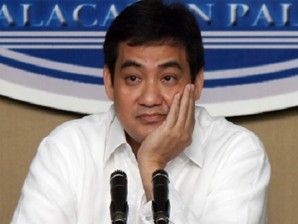Palace: Corruption still exists, but it’s down
MANILA, Philippines—Corruption persists in the bureaucracy but Filipinos are aware of President Aquino’s efforts to root it out, Malacañang said on Wednesday.
“We recognize that there are still some levels of corruption,” presidential spokesman Edwin Lacierda told reporters on Wednesday.
He was commenting on the findings of Transparency International’s Global Corruption Barometer report indicating that 3 out of 10 Filipinos believe that corruption has gone down.
The results of the TI’s corruption report this year showed that 35 percent of Filipinos felt that corruption had “decreased a little” over the past two years.
Nineteen percent said corruption “increased a lot” under the Aquino administration.
Article continues after this advertisementUsing the international civil society organization’s own data, Lacierda pointed out that more Filipinos in 2013—or at least 35 percent of the respondents—believed corruption has decreased. He noted that this was up from six percent in 2010.
Article continues after this advertisementThis meant an “increase in the recognition that corruption has decreased under this administration,” Lacierda said.
“The people have seen that there is a consistent fight against corruption under this government and so that has been recognized by those surveyed,” he said.
In its survey of 114,000 people in 107 countries, Transparency International found that “bribe-paying” remained very high worldwide, including in the Philippines.
Battlecry
Twelve percent of the Filipino respondents reported having paid bribes in the past year to one of the eight services: police, judiciary, registry, land, medical, education, tax and utilities.
Rooting out corruption to reduce poverty has been the battlecry of the Aquino administration since assuming office in June 2010 following the scandal-wracked Arroyo administration.
Early in his administration, Aquino trained his guns on executives of government-owned and controlled corporations enjoying excessive perks, prompting Congress into passing legislation to reform the government corporations.
In June this year, the President praised the government-owned and -controlled corporations for turning in P77 billion in dividends from 2010 to 2013, improving on their P96-billion total remittance in the previous nine and a half years.
Lacierda said the fight against corruption would continue “to the very last day in our administration.”
“You can call us and report to us the erring government officials and employees. We will not countenance corruption. Once we have full evidence, we will investigate and mete out the necessary sanctions,” he said.
And if there’s any legacy Aquino would want to leave behind when he steps down in 2016, it would be the change in attitude of Filipinos toward government, Lacierda said.
“After six years, you will be the judge of the legacy. We will show you… I think one of the things that you could say is that the attitude of the people towards government has changed dramatically,” he said.
